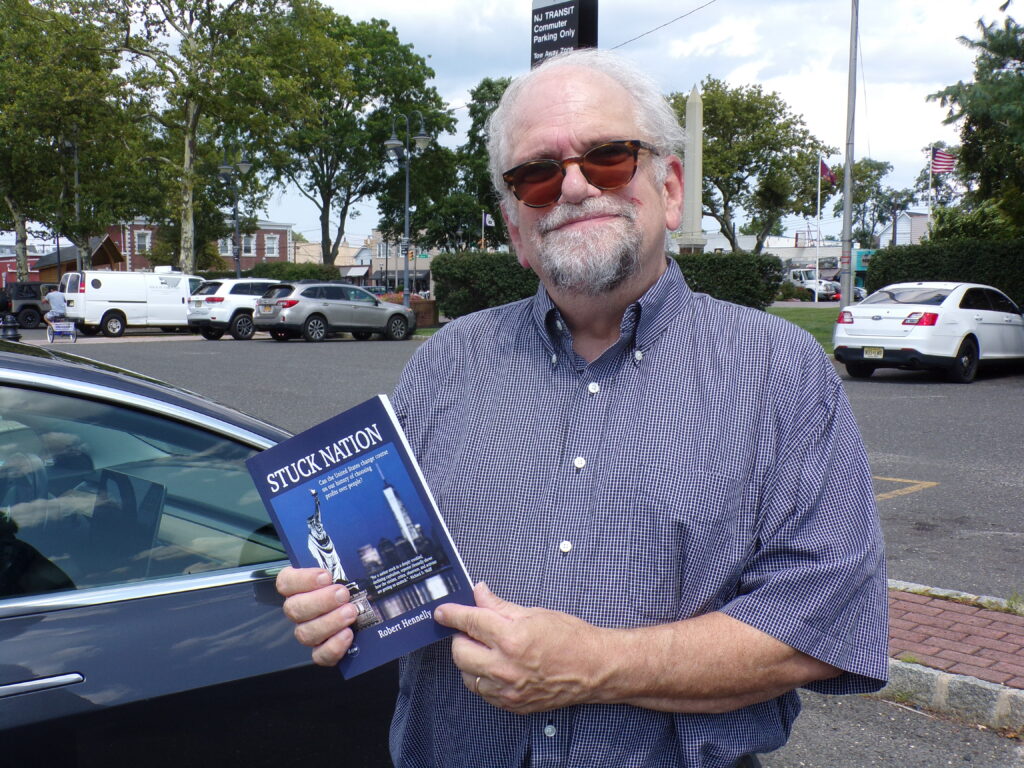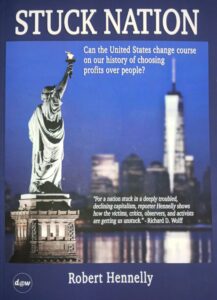'Stuck Nation' Author Hennelly Sees a Chance for Labor to Gain Ground


BRADLEY BEACH - A native of Paterson, Robert "Bob" Hennelly earned ten cents an inch when he started working for the Ramsey Mahwah Reporter, a job in which he all but acted as a human barricade against total pave-over, as overdevelopment in New Jersey - in the name of lowering property taxes - created so much impervious surface that the earth lost its ability to recharge water.
That event - and myriad others like it - expressed and continue to express, the compounded capacities of Stuck Nation, which happens to be the title of InsiderNJ reporter Hennelly's new book, published by Democracy at Work, an on-the-ground dispatch on the condition of America; how we got here, and how we can get out.
"There are two core principals in our country operating at the same time, one is community-minded and considers the collective well-being of citizens; and one is rooted in individual competition and individual success," said Hennelly. "Government is in a position to mediate that so that the public interest isn't undermined to the point where you see capital interest ruling the roost.
"Unfortunately in my lifetime, since the 70s, the balance of power between capital and labor became skewed so heavily toward capital," added the author.
The COVID-19 crisis and the deaths of 613,000 people, including large numbers of essential workers, have forced America into a position where we will either profoundly reconsider that balance of power, or further fall prey to the late stages of vulture capitalism, in Hennelly's judgement.
The son of North Jersey activists, the future award-winning WBGO-Newark Public Radio, CBS 60 Minutes and New York Times reporter originally felt compelled to immerse himself in government and politics reporting following the assassination of John F. Kennedy. As a child, he felt the loss of idealism in the country as a consequence of that event, never substantially regained. A critical opportunity - the election of Barack Obama to the presidency in 2008 - became merely another re-entrenchment of a Stuck Nation.
From the book:
As the Obama years drew to a close, the Economic Policy Institute (EPI) observed astutely that the country had "suffered from rising income inequality and chronically slow growth in the living standards of low - and moderate-income Americans." The 2015 EPI analysis continued, "This disappointing living-standards growth - which was in fact caused by rising income inequality - preceded the Great Recession and continues to this day. Fortunately, income inequality and middle-class living standards are now squarely on the political agenda. But despite their increasing salience, these issues are too often discussed in abstract terms. Ignored is the easy-to-understand root of rising income inequality, slow living-standards growth, and a host of other key economic challenges: the near stagnation of hourly wage growth for the vast majority of American workers over the past generation. Countering that by generating broad-based wage growth is our core economic policy challenge.
By Labor Day 2016, after eight years of Obama, America's workers were really stuck and even losing ground, as wealth concentration and income disparity actually accelerated. Despite adding 10 million jobs over his tenure, 1.6 million working-age Americans actually dropped out of the workforce. The labor force participation rate slid from 66 percent to a low of 62.6 percent under Obama."
The erosion of the middle class that has been in the making at least since the 1970s - when American workers stopped seeing their wages grow at a pace with their increasing productivity - was continuing By August 2016, EPI reported that from 1973 until 2015, while productivity was increasing more than 73 percent, hourly pay for workers went up only 11 percent. In other words, productivity grew by more than six times the rise in wages earned by workers.
Over the arc of Hennelly's years as a reporter, we traded the diminishment of our natural resources, including drinking water, for the promise of affordability, even as the quality of life for most declined or remained flat, along with incomes. "We fooled ourselves into believing that we were living in the halcyon days of the 1950s, when in reality we were running up debt; going hundreds of billions of dollars into debt, in part owing to military investments, which is all coming due now. A huge amount of wealth is not going to innovation but LLCs domiciled in the Cayman Islands, leveraged to influence our politics. Science is a process. It's not static. Unfortunately, our politics is stuck. Politics is about propaganda as opposed to having the courage to evaluate our... circumstances."
COVID-19 revealed the starkest divisions.
It revealed a president, - a "white supremacist authoritarian" - Donald Trump, intent on pitting states against one another for his own advantage instead of acting as a shield to help those states. His leadership during the crisis was "as threatening as the virus itself."
"Credit Cuomo, Murphy, Lamont and other regional governors pulling together in a compact to fight COVID-19, which I believe historians will see as significant as what happened with the 13 colonies," Hennelly said.
Significant, but far short of the structural overhaul America requires in order to offset the longstanding imbalances we created, going back to those local planning boards Hennelly covered in North Jersey, and back to the early 60s, to the airbrushed killing of Kennedy, and the deepening of a political system that protects corporate power at the expense of working people.
"The president denied the [COVID] problem and resisted efforts by unions to get testing and masks; the whole notion was we can't have this disease imperil our economy," said Hennelly. "People had to choose between their jobs and their lives. What we see now is there is a national reconsideration about work. People are voting with their feet. They are asking, 'What is my life really about? Is it about making the most money I can or quality of life?' I did see in the aftermath of 9/11, unions, first responders and lower Manhattan come together to make sure there was a program to deal with their health issues; acting in a collective interest."
It can happen again, Hennelly insisted, and it must - with greater and more sustained impact.





